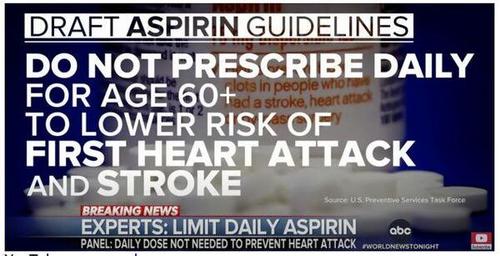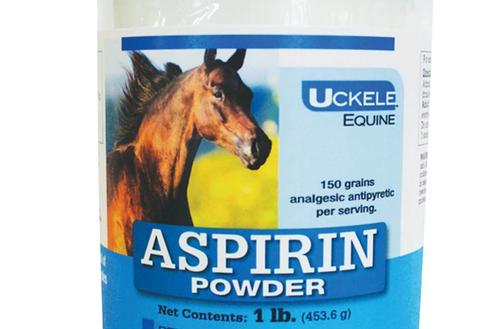Oh neigh you didn't...
A paper in Anesthesia and Analgesia published last spring titled, “Aspirin use is associated with decreased mechanical ventilation, intensive care unit admission, and in-hospital mortality in hospitalized patients with coronavirus disease 2019.”
This was a retrospective, observational study of adult patients admitted to multiple hospitals in the U.S. between March and July 2020, in the early days of COVID. The primary outcome addressed by the researchers from George Washington University was the need for mechanical ventilation, which then, and still now, carries an extremely high chance of never leaving the ICU alive.
This was not a gold standard randomized prospective clinical trial. That would not be feasible in this situation since study patients were already hospitalized and critically ill. Remember in the early days, one needed to be extremely ill before even being admitted to the hospital rather than being sent home until sick enough to return and go straight to the ICU.
But the results were impressive. As reported last week by the Jerusalem Post,
The team investigated more than 400 COVID patients from hospitals across the United States who take aspirin unrelated to their COVID disease, and found that the treatment reduced the risk of several parameters by almost half: reaching mechanical ventilation by 44%, ICU admissions by 43%, and overall in-hospital mortality by 47%.
Why would aspirin be helpful for COVID, a respiratory disease? What if COVID is more than simply a lung disease or pneumonia? COVID is actually thought to be a microvascular disease causing blood clots, as described in the medical journal Circulation,
Although most patients with coronavirus disease 2019 (COVID-19) present with a mild upper respiratory tract infection and then recover, some infected patients develop pneumonia, acute respiratory distress syndrome, multi-organ failure, and death. Clues to the pathogenesis of severe COVID-19 may lie in the systemic inflammation and thrombosis observed in infected patients. We propose that severe COVID-19 is a microvascular disease in which coronavirus infection activates endothelial cells, triggering exocytosis, a rapid vascular response that drives microvascular inflammation and thrombosis.
Note the thrombosis aspect, blood clots forming in the lungs and elsewhere in the body. Aspirin, as a blood thinner, reduces the risk of blood clots, explaining its potential benefit for COVID.

For the same reason, the American Heart Association recommends,
If you have had a heart attack or stroke, your doctor may want you to take a daily low dose of aspirin to help prevent another. Aspirin is part of a well-established treatment plan for patients with a history of heart attack or stroke.
Add the appropriate caveat, which I would echo, “You should not take daily low-dose aspirin on your own without talking to your doctor. The risks and benefits vary for each person.”
How did aspirin get its start? Over 3,500 years ago, willow bark, known as “nature’s aspirin,” was used as a painkiller and antipyretic by ancient Egyptians and Greeks, and in a chemical synthesis by a Bayer chemist in 1897.
Aside from pain relief, it was found to have anti-platelet and anti-cancer effects. It’s also on the World Health Organization’s list of essential medicines, along with another familiar drug, ivermectin. The Harvard-based physicians’ health study in the 1980s found that low-dose aspirin reduced the risk of heart attack by 44 percent.
A recently published Israeli study found, “Aspirin use is associated with better outcomes among COVID-19 positive patients.” This included a lower likelihood of infection, disease duration, and hospital survival. In other words, aspirin works as both a preventative and as a treatment.
Aspirin is another potential therapeutic, along with hydroxychloroquine and ivermectin, which is inexpensive, readily available, and relatively safe, and could save countless lives when used appropriately for COVID. An editorial in Anesthesia and Analgesia described aspirin for COVID as, “An old, low-cost therapy with a strong rationale.” And right on cue, it’s time for aspirin-bashing to commence.
At the same time as these papers showing potential benefits of aspirin for COVID hit the news, the U.S. Preventative Services Task Force, on Oct. 12, posted draft recommendations saying that, “Once people turn 60 years old, they should not consider starting to take aspirin because the risk of bleeding cancels out the benefits of preventing heart disease.” What curious timing.
Certainly, aspirin has potential side effects including an increased risk of bleeding. All medications have side effects and one can even die from drinking too much water. It always comes down to medical decision-making, balancing risks and benefits, in consultation with one’s healthcare provider.
The media wasted no time in using the suddenly released and new aspirin recommendations at the same time as news reports on aspirin benefits for COVID hit the news.
NBC reported, “Most adults shouldn't take daily aspirin to prevent heart attack, panel says.” The New York Times echoed, “Daily low-dose aspirin no longer recommended by doctors, if you’re healthy.” Healthline went further, “Doctors warn daily aspirin use can be dangerous.” Driving or walking across the street can be dangerous too.
Sound familiar? How many adults have been taking low-dose aspirin daily for many years, based on the decades-old Harvard study? I have as I have a family history of cardiovascular disease and my internist and I agree that the benefits outweigh the risks, despite the new recommendations.
Similarly how many patients have been taking hydroxychloroquine for years or decades for arthritis or lupus, without dying from the drug as Fox News crank Neil Cavuto warned last year? How many take ivermectin to prevent parasitic infections? Now we can add aspirin to the list of once safe and effective medications -- that's now on par with cyanide or strychnine.
It seems the medical establishment and the media want to squash any potential COVID therapeutic, especially the inexpensive ones, instead pushing vaccines and extremely pricey medicines like Merck’s new $712 COVID drug.
The media described ivermectin as horse dewormer or animal paste, seemingly unaware that it is an FDA-approved medication for human use and was once honored with a Nobel Prize. Watch Joe Rogan put CNN’s medical mouthpiece, Dr. Sanjay Gupta, in a virtual chokehold until he tapped out and admitted to CNN’s irresponsible reporting and lying about ivermectin.
Aspirin also has non-medical uses including as a stain remover, garden enhancer, and dandruff remedy. I would love to hear President Trump mention the potential benefits of aspirin for COVID and see the news headlines of Trump recommending people ingest detergent, fertilizer, or shampoo to treat COVID.
Welcome to simple aspirin, the media’s new horse dewormer.
Brian C. Joondeph, M.D., is a physician and writer. On Twitter and FreeAtlantis as @retdoc.

No comments:
Post a Comment